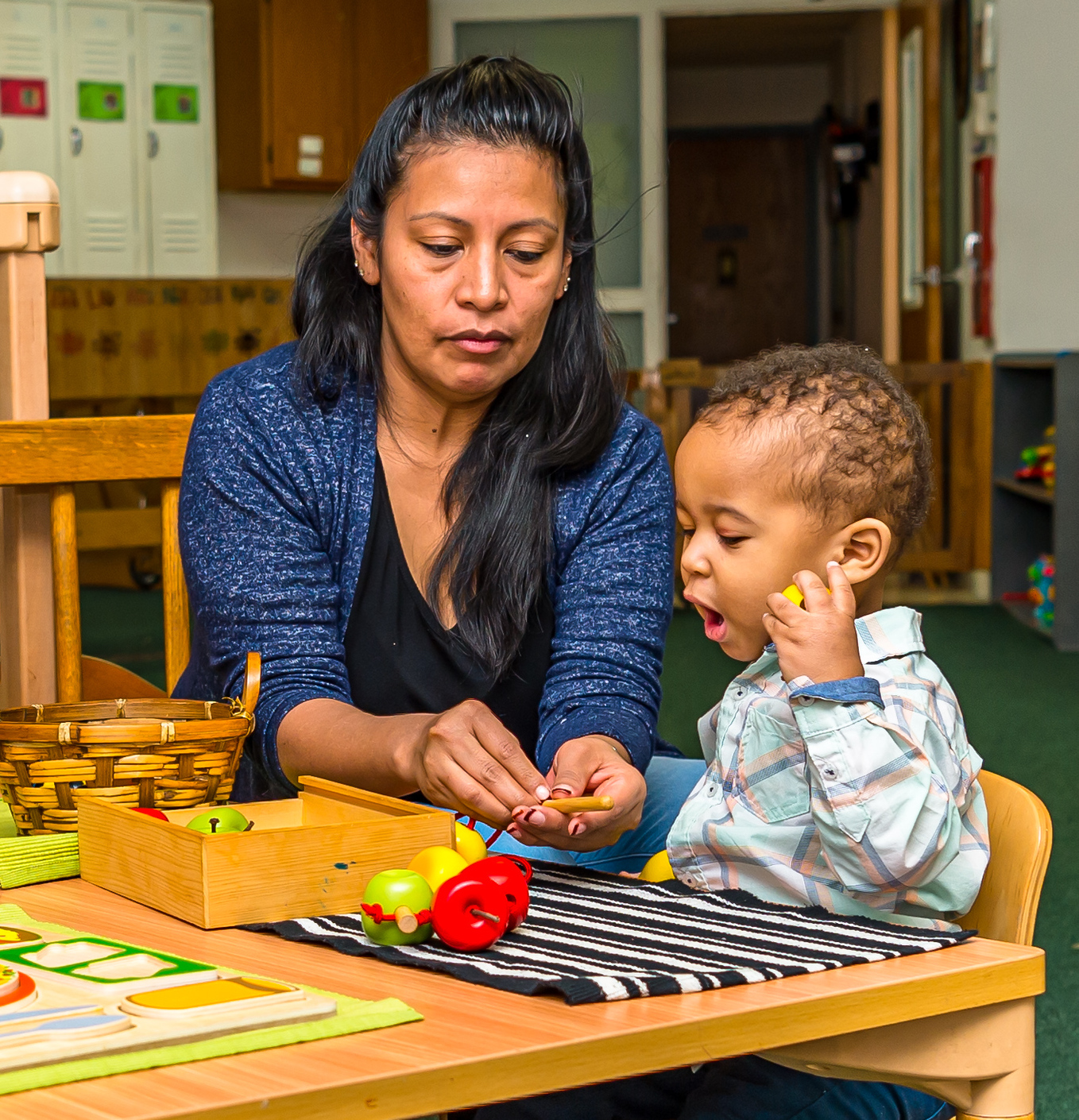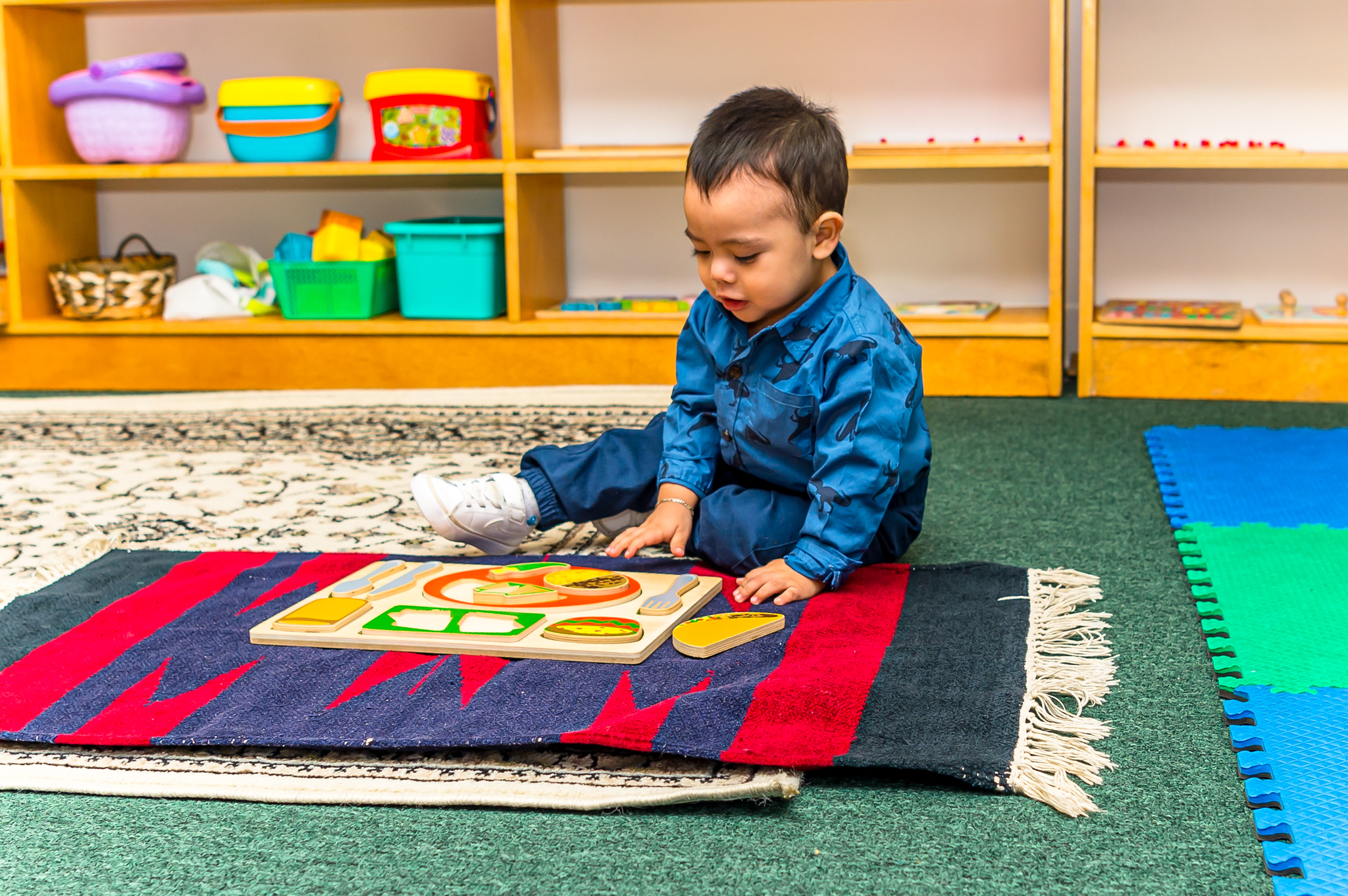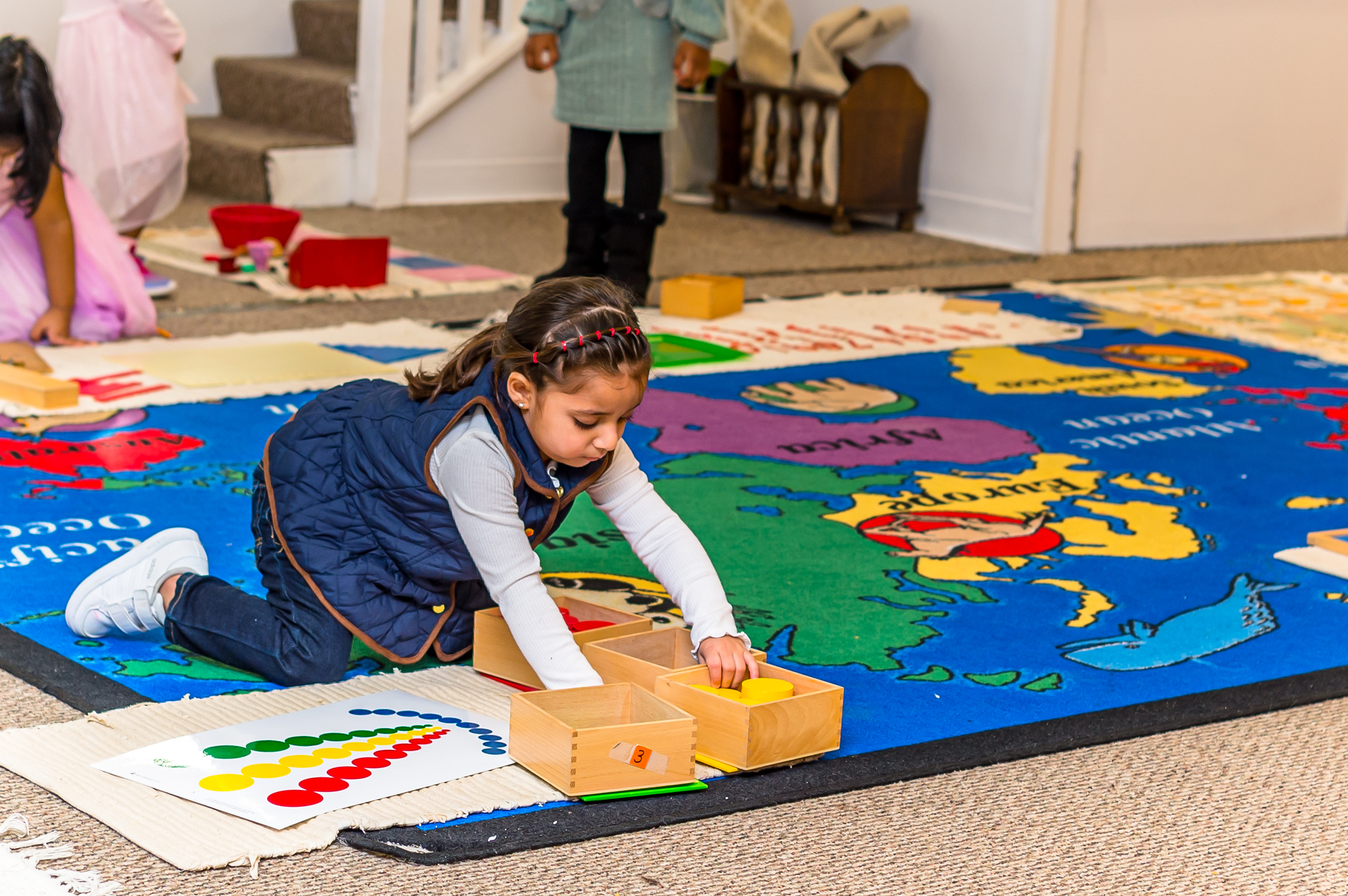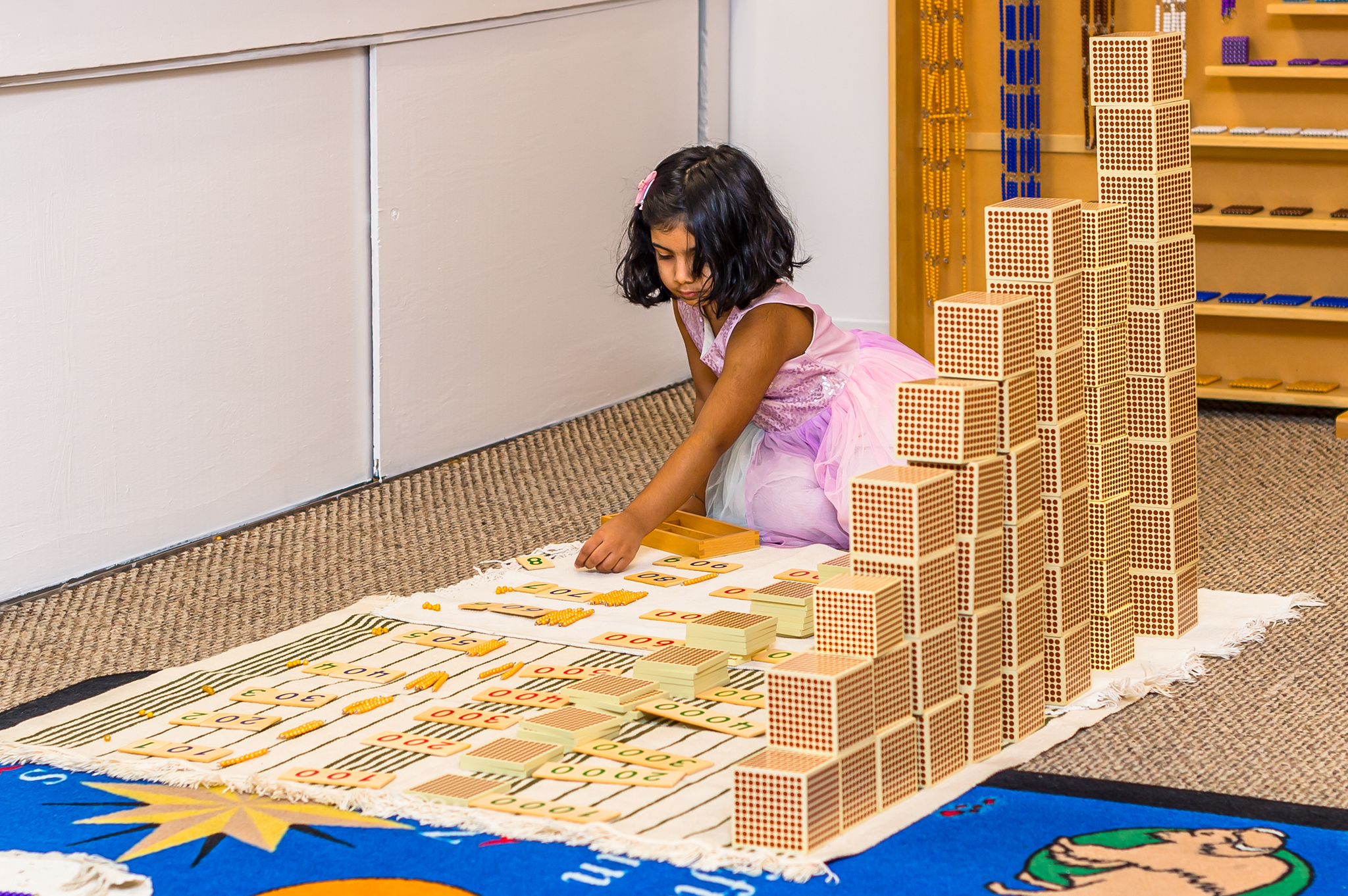A Montessori Education
Montessori education dates back to January 6, 1907, when Maria Montessori, an Italian physician, educator and innovator, acclaimed for her educational method that builds on the way children naturally learn, opened the Casa dei Bambini, or Children’s House, in a low-income district of Rome. There are now more than 22,000 Montessori schools in at least 110 countries worldwide. At Inclusive Montessori School, we believe that an educational approach based on the natural curiosities that exist in all humans is the best way to build a solid foundation for a life-long love of learning. We are therefore proud to educate children in accordance with the Montessori philosophy of education.

The Montessori Curriculum
The Montessori curriculum is a hands-on approach which leads to growth and transformation. Our teachers focus on each individual child and consider all aspects of his or her development—physical, intellectual, social and emotional. We are sensitive to each child’s feelings and uniqueness, and recognize his or her individual ability to learn. Our teachers follow the child’s lead and help each child to improve his or her learning.
The Montessori approach allows children to learn through understanding, rather than through being told. From this understanding, children are able to develop confidence and a joy in learning. By understanding how children learn, the teachers can provide your child with tools and opportunities tailored to the way he or she experiences the world. At the same time, there is a strong physical dimension to many Montessori activities, encouraging dexterity, balance and appreciation of shapes, colors and sizes.
At Inclusive Montessori School, we provide the building blocks of future learning, hardwiring your child’s capacity to engage with new materials and information, and providing the tools with which to manipulate them. We are here to support our children’s individual journeys of learning and to help them make positive imprints upon the world.
Practical life
Practical Life activities prepare children, through active experience, for everyday life. Recognizing that young children’s focus centers around their own lives and experiences, we select activities that reflect our children’s lives and cultures. Through their collaborative participation in Practical life activities, our children gain a sense of being and belonging. Practical Life exercises help children develop independence, focus, self-confidence, concentration and self-control, and prepare them for future learning. These activities link home and school, develop grace and courtesy, and build care of self and care of the environment.
Language Arts
Language is incorporated in all areas of our curriculum. We provide opportunities for oral and written expression through reading and drama. Language lessons include spoken language, written expression and reading. Through every conversation, every book read aloud, every new word that is taught, the Montessori student is learning language, and thus, learning to read. At Inclusive Montessori School, we emphasize the process of acquiring language.
Mathematics
Learning mathematical concepts in a Montessori classroom begins concretely and progresses towards the abstract. Aligning with children’s learning styles, we begin by teaching the process and then introduce facts later. We provide manipulative materials which can be felt and manipulated so that the hand is always involved in the learning process, allowing children to internalize math and number concepts. This approach to math is logical, clear and extremely effective. It allows the students to develop a solid foundation in mathematics and to progress at their own pace toward abstract concepts. The Montessori method of teaching math provides children with a conceptual understanding, a foundation for later work in algebra and geometry.
Sensorial
Maria Montessori believed, and current research has demonstrated, that children learn through sensory experiences. We therefore provide a wide variety of sensory-rich experiences, knowing that the more sensory experiences children have, the more the sensory cortex of their brains will be activated, the more their sensitivity to texture solidifies and the more their hand-eye coordination increases.
Cultural Studies
Art, music, dance, nature/life science, history, science and geography are all integrated into our curriculum.
Montessori vs. ‘Traditional’ Education
Montessori and ‘Traditional’ education programs both provide learning experiences for your child. The main differences between the two methods is how they provide those learning experiences.
There are four main elements that distinguish a Montessori classroom from other ‘Traditional’ classrooms:
-
All equipment is accessible and always available to the child.
-
Your child has freedom of movement both indoors and out, as well as a choice of what to do for much of the day
-
Your child will have personal responsibility for his or her work; this requires an awareness of the needs of others, avoiding dangerous or hurtful actions, keeping the equipment and resources tidy, putting things away after using them, being good role models for younger children and developing a true social awareness.
-
Beauty and Harmony: This aspect is too often ignored by those who focus too much on the content of learning. Montessori felt strongly that the environment must be aesthetically pleasing to encourage learning and concentration. Too many displays can distract children if they are not properly related to their interests. The Montessori classroom is calm and activities are self-directed.
Montessori Education
-
Based on the development of the child
-
Children follow their own interests and learn at their own pace
-
Children teach themselves via specially prepared materials
-
Children develop their ability to discover for themselves
-
Learning based on physical exploration of environment
-
Teacher works with children
-
Intrinsic motivation
-
Uninterrupted work flow
-
Multi-age classrooms
‘Traditional’ Education
-
Based on the transfer of a national curriculum
-
Children learn from a set curriculum according to a preset time frame
-
Children are taught by the teacher
-
Learning is based on subjects and based on what is given
-
Children sit at desks using worksheets and white boards
-
Class is teacher led
-
Motivation through rewards and punishments
-
Block time, period lessons
-
Single-grade classrooms
Infant & Toddler Program Ages 6 weeks – 2.5 years old
Our Montessori based infant & toddler curriculum supports the physical, cognitive, social and emotional development of each child. Toddlers strengthen speech and language development and both fine and gross motor skills as they explore self, family and the world in which they live. The toddler program prepares the toddler class children for preschool work by exposing them to each area of our Montessori curriculum. The toddlers learn concentration, coordination, language skills, responsibility and respect, all of which prepare them well for a successful transition into preschool at Inclusive Montessori School.
A typical day in a toddler classroom is carefully structured to balance learning, play, and rest to support the developmental needs of young children. Here’s a sample schedule that may be followed in a toddler classroom:
Morning Arrival (7:30 am – 8:30 am):
Parents drop off their children, who are greeted by teachers with warm welcomes and smiles.
Children engage in free play with toys, puzzles, and books while other children arrive.
Breakfast (8:30 am – 9:00 am):
Children gather for breakfast, where they practice social skills like sitting together, using utensils, and conversing with peers and teachers.
Circle Time (9:00 am – 9:30 am):
The class gathers for circle time, where they sing songs, read stories, and engage in group activities that introduce concepts like colors, shapes, and numbers.
Structured Learning Activities (9:30 am – 10:30 am):
Teachers lead small-group activities or individualized learning tasks based on age-appropriate themes and goals.
Activities may include art projects, sensory play, and simple science experiments.
Outdoor Play (10:30 am – 11:15 am):
Children go outside to play on playground equipment, run around, and engage in gross motor activities to develop physical skills.
Teachers supervise and facilitate games that encourage cooperation and imaginative play.
Snack Time (11:15 am – 11:45 am):
Children gather for a nutritious snack, practicing self-help skills like pouring drinks and serving themselves.
Teachers use this time to encourage conversation and teach about healthy eating habits.
Music and Movement (11:45 am – 12:15 pm):
Children participate in music and movement activities such as dancing, singing, and playing musical instruments.
This time promotes coordination, rhythm, and self-expression.
Lunch (12:15 pm – 1:00 pm):
Children eat lunch together, fostering social skills and independence as they feed themselves and engage in mealtime conversation.
Nap/Rest Time (1:00 pm – 3:00 pm):
Children have a quiet period for nap or rest time. Soft music or story recordings may be played to help children relax.
Teachers use this time to tidy up the classroom and prepare for the afternoon activities.
Afternoon Free Play (3:00 pm – 4:00 pm):
Children engage in unstructured play with various toys and materials, allowing them to explore and express themselves creatively.
Snack Time (4:00 pm – 4:30 pm):
Another snack time provides children with energy for the remainder of the day’s activities.
Story Time or Group Activity (4:30 pm – 5:00 pm):
Children gather for a final group activity, such as a story read-aloud or a game that reinforces learning concepts.
Departure (5:00 pm – 6:00 pm):
Parents arrive to pick up their children, and teachers provide feedback on their child’s day and any notable achievements or concerns.
Throughout the day, teachers closely observe and interact with children, providing support, guidance, and encouragement as they explore, learn, and grow. The environment is safe, nurturing, and stimulating, fostering the holistic development of each child in the toddler classroom.


Primary Program Ages 2.5 – 4 years old
Recognizing that this is an age of critical social development, we create an environment in which children are given the opportunity to develop as individuals within a social community. Our Primary Program cultivates basic motor coordination and language development. Our curriculum integrates key academic skills including math, science, geography, practical life, visual arts and sensorial learning as we lay the foundation for our children’s next steps in their education.
In an inclusive Montessori pre-K, the schedule is designed to accommodate the diverse needs and developmental stages of the children while adhering to Montessori principles of self-directed learning and individualized instruction. Here’s a typical day in such a classroom:
Morning Arrival (8:00 am – 8:30 am):
Children arrive at school and engage in a brief period of free play while teachers greet them and facilitate smooth transitions into the classroom.
Morning Meeting (8:30 am – 9:00 am):
The day starts with a brief morning meeting where children gather together for a group discussion, sharing thoughts, ideas, and plans for the day.
This time may also include a short mindfulness or meditation activity to set a calm and focused tone for the day.
Montessori Work Cycle (9:00 am – 11:30 am):
The bulk of the morning is dedicated to the Montessori work cycle, during which children have the freedom to choose activities from various learning areas in the classroom.
Children engage in self-directed exploration of materials such as practical life activities, sensorial materials, math manipulatives, language materials, and cultural studies materials.
Teachers circulate throughout the classroom, offering individualized lessons, guidance, and support as needed, and observing children’s progress and interests.
Outdoor Exploration (11:30 am – 12:00 pm):
Weather permitting, children go outside to explore and play in a natural outdoor environment, fostering gross motor skills, sensory experiences, and appreciation for nature.
Teachers may facilitate group games or provide open-ended materials for imaginative play.
Lunchtime (12:00 pm – 12:30 pm):
Children gather for lunch, practicing grace and courtesy as they serve themselves and interact with peers during mealtime.
Teachers use this time to model healthy eating habits and engage in conversation with children.
Quiet Time/Rest Period (12:30 pm – 1:30 pm):
After lunch, children have a quiet period for rest or relaxation. Soft music or story recordings may be played to promote a calm atmosphere.
Children who do not nap may engage in quiet activities such as reading, drawing, or puzzles.
Afternoon Work Cycle (1:30 pm – 3:00 pm):
The afternoon continues with another Montessori work cycle, providing children with opportunities to further explore materials and follow their interests.
Teachers continue to offer guidance, lessons, and support as children engage in independent and collaborative learning activities.
Snack Time (3:00 pm – 3:30 pm):
Children gather for a healthy snack, fostering socialization and providing a boost of energy for the remainder of the day.
Group Activities/Enrichment (3:30 pm – 4:00 pm):
The afternoon may include group activities or enrichment experiences such as art projects, music and movement, or science experiments.
These activities allow children to collaborate, express creativity, and explore new concepts in a social setting.
Closing Circle (4:00 pm – 4:30 pm):
The day concludes with a closing circle where children come together to reflect on their learning experiences, share accomplishments, and express gratitude.
Teachers may read a story, sing songs, or lead a group discussion focused on themes related to character development, empathy, or community.
Dismissal (4:30 pm – 5:00 pm):
Parents arrive to pick up their children, and teachers provide feedback on their child’s day, highlighting achievements and discussing any areas for growth or support.
Teachers may also share information about upcoming events or learning opportunities.
Throughout the day, the classroom environment is carefully prepared to foster independence, exploration, and a sense of belonging for all children, regardless of their abilities or backgrounds. Teachers serve as guides and facilitators, nurturing each child’s unique potential and fostering a love of learning that extends beyond the classroom.

Kindergarten Ages 4-6 years
Through the Montessori Method, our children begin as novices, grow to be apprentices and, in their Kindergarten year, they become leaders.
At Inclusive Montessori School your child continues to set the pace for his or her own education and developmental growth. Our Kindergarten curriculum is carefully structured and integrated to demonstrate the connections among different areas of learning. Your child’s Kindergarten year highlights critical thinking, composition, and research-based projects.
Children who attend Inclusive Montessori School will have a distinct edge over those who attend traditional Kindergarten in terms of academics and social development. Children graduate from our school with a strong sense of self-confidence, enthusiasm for learning and close bonds with their teachers and classmates. We want much more than competency in the basic skills; we want them to truly enjoy school and feel good about themselves as students.
In an inclusive Montessori Kindergarten, the schedule is designed to accommodate the diverse needs and developmental stages of the children while adhering to Montessori principles of self-directed learning and individualized instruction. Here’s a typical day in such a classroom:
Morning Arrival (8:00 am – 8:30 am):
Children arrive at school and engage in a brief period of free play while teachers greet them and facilitate smooth transitions into the classroom.
Morning Meeting (8:30 am – 9:00 am):
The day starts with a brief morning meeting where children gather together for a group discussion, sharing thoughts, ideas, and plans for the day.
This time may also include a short mindfulness or meditation activity to set a calm and focused tone for the day.
Montessori Work Cycle (9:00 am – 11:30 am):
The bulk of the morning is dedicated to the Montessori work cycle, during which children have the freedom to choose activities from various learning areas in the classroom.
Children engage in self-directed exploration of materials such as practical life activities, sensorial materials, math manipulatives, language materials, and cultural studies materials.
Teachers circulate throughout the classroom, offering individualized lessons, guidance, and support as needed, and observing children’s progress and interests.
Outdoor Exploration (11:30 am – 12:00 pm):
Weather permitting, children go outside to explore and play in a natural outdoor environment, fostering gross motor skills, sensory experiences, and appreciation for nature.
Teachers may facilitate group games or provide open-ended materials for imaginative play.
Lunchtime (12:00 pm – 12:30 pm):
Children gather for lunch, practicing grace and courtesy as they serve themselves and interact with peers during mealtime.
Teachers use this time to model healthy eating habits and engage in conversation with children.
Quiet Time/Rest Period (12:30 pm – 1:30 pm):
After lunch, children have a quiet period for rest or relaxation. Soft music or story recordings may be played to promote a calm atmosphere.
Children who do not nap may engage in quiet activities such as reading, drawing, or puzzles.
Afternoon Work Cycle (1:30 pm – 3:00 pm):
The afternoon continues with another Montessori work cycle, providing children with opportunities to further explore materials and follow their interests.
Teachers continue to offer guidance, lessons, and support as children engage in independent and collaborative learning activities.
Snack Time (3:00 pm – 3:30 pm):
Children gather for a healthy snack, fostering socialization and providing a boost of energy for the remainder of the day.
Group Activities/Enrichment (3:30 pm – 4:00 pm):
The afternoon may include group activities or enrichment experiences such as art projects, music and movement, or science experiments.
These activities allow children to collaborate, express creativity, and explore new concepts in a social setting.
Closing Circle (4:00 pm – 4:30 pm):
The day concludes with a closing circle where children come together to reflect on their learning experiences, share accomplishments, and express gratitude.
Teachers may read a story, sing songs, or lead a group discussion focused on themes related to character development, empathy, or community.
Dismissal (4:30 pm – 5:00 pm):
Parents arrive to pick up their children, and teachers provide feedback on their child’s day, highlighting achievements and discussing any areas for growth or support.
Teachers may also share information about upcoming events or learning opportunities.
Throughout the day, the classroom environment is carefully prepared to foster independence, exploration, and a sense of belonging for all children, regardless of their abilities or backgrounds. Teachers serve as guides and facilitators, nurturing each child’s unique potential and fostering a love of learning that extends beyond the classroom.
+ Before and After School Care
Our Before & After Care Program is designed to promote independence, communication and problem-solving skills. The pace is intentionally more relaxed then our core learning programs, with more time for free play and outdoor activities. Our program includes art, yoga, gymnastics, soccer and other extracurricular activities.
We offer convenient before and after school care programs. Please contact us for details.
+ Healthy Eats Food Program
Join our Healthy Eats Food Program for FREE!
Our school’s unique initiative ensures the complete well-being of your growing child through healthy living, nutritious eating and physical fitness. The goal is to help children develop healthy habits for the future. We provide healthy meals and snacks which include:
Fresh fruits and vegetables
Foods with whole grains and plenty of vitamins
Foods free of artificial dyes
Milk
Vegetarian meal options
We do not serve juice or fried foods

Summer program
Summer is a time for fun, and also a time for learning. At Inclusive Montessori School’s Summer Program, we practice language, writing, math, reading and science, and enjoy field trips, cooking, water play, music, sports, arts, crafts, swimming and gym. We keep your children engaged and their intellect sharp in a relaxed, positive environment.
